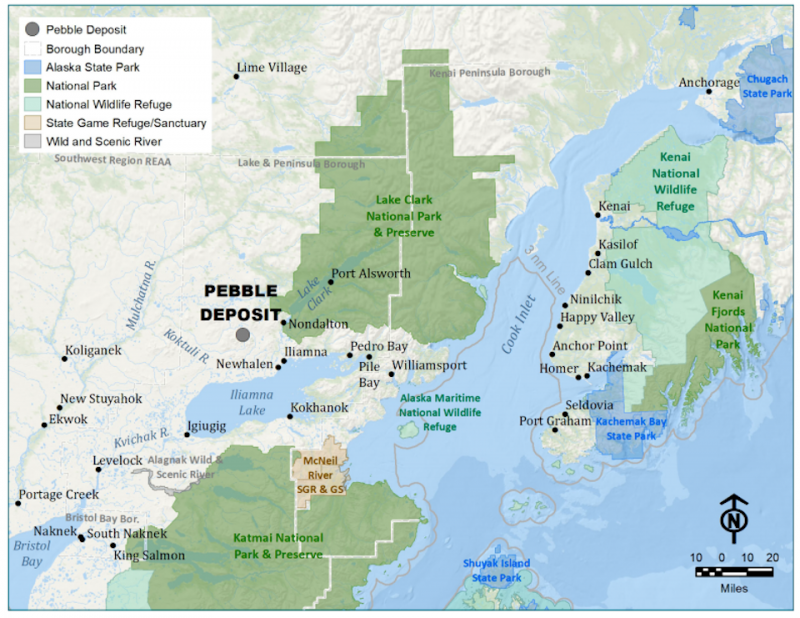
The U.S. Army Corps of Engineers has decided against issuing a necessary permit that would allow the proposed Pebble Mine to move forward/USACE
The U.S. Army Corps of Engineers, deciding that a sprawling gold, copper, and molybdenum mine proposed to be built near Lake Clark National Park and Preserve in Alaska was not in the best interest of the public, refused to issue a crucial permit needed to move the Pebble Mine forward.
That decision Wednesday more than likely halted a project more than a decade in the works. It was an enormous proposal roughly 14 miles from Lake Clark's southwestern boundary that the Environmental Protection Agency under the Obama administration said would create miles and miles of lost or blocked streams, thousands of acres of lost wetlands, and send biological shudders through the underlying ecosystem and nearby Bristol Bay.
“Today’s decision smartly prioritizes the long-term health of people, national parks and wildlife including the world’s largest salmon run, over international mining interests," said Theresa Pierno, president and CEO of the National Parks Conservation Association. "The Army Corps’ rejection of the Pebble Mine permit reflects the will of the Alaska Natives in Bristol Bay who have fought the mine for years as well as those who have fought alongside them to stop this disastrous mine.
“While today’s decision halts the Pebble Mine, it does not afford permanent protections, which the region deserves and absolutely needs to prevent future threats. The National Parks Conservation Association continues to urge the Environmental Protection Agency to veto the project."
As recently as July the Trump administration seemed to be behind the project, saying the proposed open pit mine doorstep of Lake Clark National Park and across from Katmai National Park would not harm the fisheries of Bristol Bay.

Some of the wetlands in the area of the proposed open-pit mine/EPA
Northern Dynasty Minerals has wanted to build its mine along with "an 82-mile road, pipeline and utilities corridor to a permanent, year-round port facility on Cook Inlet, a lightering location in Iniskin Bay, a 164-mile natural gas pipeline from existing energy infrastructure on the Kenai Peninsula to the Pebble mine site, a 270 MW natural gas-fired power plant at the mine site and smaller power generation facility at the port site."
It was just six months into President Trump's tenure that the Environmental Protection Agency opened a 90-day comment period on its proposal to withdraw an Obama administration decision to restrict the discharge of dredged or fill material associated with the potential “Pebble Mine.” Without the requisite Section 404 discharge permit, the project couldn't move forward.
But this July the U.S. Army Corps of Engineers released its final environmental impact statement on the project, stating, in essence, that the Obama administration was wrong and that the project with its 20-year life could move forward without great threat to the environment.
On Wednesday, though, the Corps reversed course, saying the project "does not comply with Clean Water Act guidelines.”









Comments
Great news!!
Pebble needs to be "KILLED" permantely, once and for all. America's bread-basket of "Wild Salmon" is the Bristol Bay Fisheries. If we lose any of the "Bristol Bay Salmon Fishery" because of Pebble its "Game Over" for any great abundance of wild salmon on this planet. The only other great wild salmon fishery on this planet is Russia's Kamchatka Penninsula. Kamchatka's salmon fisheries have been under threat for decades (since the fall of the Soviet Union) from off-shore salmon poaching on the grandest scale. Guess what, Russia is not the culprit here for this poaching. I won't name the salmon poaching culprits on Kamchatka, but I'll give you a big hint, Russia's big neighbor to the south. In conclusion, utilize "Land and Water Conservation Funding" to buy out the entire Pebble Deposit from Northen Dynasty Minerals. Designate these river systems (Mulchatna, Kvichak, Nushgak, Talerek River systems) as a great salmon conservation area for Alaska and the United States.
We need institutionally stable protection (as close to bomb-proof as we can get) for an entire ecosystem that is so susceptible to human interference.